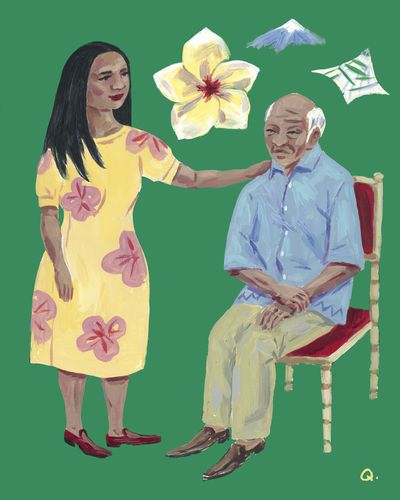Bringing the battle NEAR: New WSU-led project to combat dementia in Native, Pacific Islander communities

Through a $14.6 million National Institute on Aging grant, a Washington State University-led project will work to battle disparities associated with Alzheimer’s disease and dementia in Native populations.
The outreach in the next five years will involve American Indian, Alaska Native, Native Hawaiian and Pacific Islander groups across the U.S., including Washington state-based tribes and populations such as the Marshallese.
Although culturally and geographically diverse, Native populations share “an unequal burden of conditions such as hypertension, Type 2 diabetes and low socioeconomic status that make dementia more likely,” a WSU news release said. Life expectancy within Native groups is increasing, raising concerns that Alzheimer’s and dementias might become a public health crisis.
“The number of American Indians and Alaska Native people who are 85 years and older will increase sevenfold by 2050, so that’s good news for communities, but it also means that there is going to be a lot more cognitive impairment among those older individuals,” said Dr. Dedra Buchwald, principal investigator and Seattle-based professor in WSU’s Elson S. Floyd College of Medicine.
Along with age, other Alzheimer’s and dementia risk factors can include genetics, hypertension, lifestyle and environmental influences. “The high risk time is 85 and older, when you might have one-third of people with cognitive impairment. The number of people in this age group is going to dramatically increase, and so in parallel will these conditions.”
The project, called Natives Engaged in Alzheimer’s Research, expects to bring together about 11 tribes, six academic institutions, seven urban Indian organizations and five Native community groups. NEAR will have a nationwide network of eight satellite centers directed by researchers who are members of Native communities.
The health care systems serving these communities are largely unprepared for the clinical, social and economic costs of dementia, Buchwald said. She also is director of the WSU Institute for Research and Education to Advance Community Health, which works to advance community health via partnerships and collaborations.
The grant-funded focuses will have 12 professionals doing project work or consulting who are American Indian, Alaska Native, Native Hawaiian or Pacific Islander. Each project is co-led by an investigator who is a member of one or more of these communities.
“Our scientists are grounded in the lived experience and history of trauma surrounding research in Native and Pacific Islander communities,” Buchwald said. “The team will bring an essential understanding of research ethics, stakeholder consultation and cultural humility to effectively and appropriately test interventions to detect and treat dementia in these groups.”
One NEAR project will support clinic health providers with education and training on Alzheimer’s disease and related dementias, including how to detect and manage them, she said. The group is confirming sites now, but likely the training will be at many urban and rural Native-serving facilities in this state, including Eastern Washington.
“We’re providing culturally appropriate education to providers in clinics around the United States serving both urban and rural American Indians and Alaskan Native patients,” Buchwald said. “The intervention is with the providers to help them better recognize, detect, diagnose and manage people who have cognitive impairment and or dementia.”
Another grant-focused project will look at sleep apnea issues among Northern Plains Indian groups under research co-led by Ka’imi Sinclair, associate professor in the WSU College of Nursing. It will offer interventions for obstructive sleep apnea and use of Continuous Positive Airway Pressure therapy, commonly called CPAP machines.
“We know lack of sleep can affect brain health and sometimes lead to cognitive impairment,” Sinclair said. “We know wearing a CPAP can be quite challenging. The study is an intervention to try to encourage the CPAP machine, so they’ll get better sleep, which may reduce a person’s risk for cognitive impairment. We’re measuring whether the use of the appropriate treatment improves their cognitive function.”
Sinclair also leads recruitment and engagement. “We will be doing a lot of community engagement and workshops to raise awareness and teach people about Alzheimer’s disease and related dementias and brain health, so we’ll be doing workshops. We will be reaching out to a lot of different people in Washington and beyond.”
She said Washington has the third highest population of Native Hawaiians and Pacific Islanders, “so we have several other studies we’re conducting with them in Washington and elsewhere.”
Existing research, although limited, suggests that genetic risk factors for dementia in Native people might be different in important ways from non-Native populations, the WSU release said.
This work also will coordinate with local and community partners to develop culturally acceptable practices related to informed consent, confidentiality and data governance needed in the collection of biological samples, or biospecimens, from Native communities. “The aim is to dramatically increase the meager repository of biospecimens from these groups available for dementia research,” the release said.
A third project under the grant is based in Hawaii, where similar work is underway and will be adapted toward this dementia research, Buchwald said.
“It’s an intervention that involves exercising in the form of Hula dancing, and then cultural ancillary activities like food and diet, music and learning the language,” she said. “It looks at the effect of this culturally derived intervention on self-reported and also objectively-measured cognitive function in Native Hawaiians and Pacific Islanders.
“This research group has already shown that doing the Hula dramatically improves people’s blood pressure control. It’s a pretty powerful intervention, so we’re adapting that to look at cognitive function.”
Project leaders along with Buchwald are Dr. James Galvin, neurology professor and director of the Comprehensive Center for Brain Health at the University of Miami, and John Kauwe, biology professor and president of Brigham Young University–Hawaii. For more information, go to IREACH’s website at ireach.wsu.edu and call (206) 708-8668.
“We literally have dozens of projects on everything from diabetes to hypertension to substance abuse, and there are descriptions on our website,” Buchwald said. “It’s all basically what we call community-based participatory research, so it’s on-the-ground research with partners.”